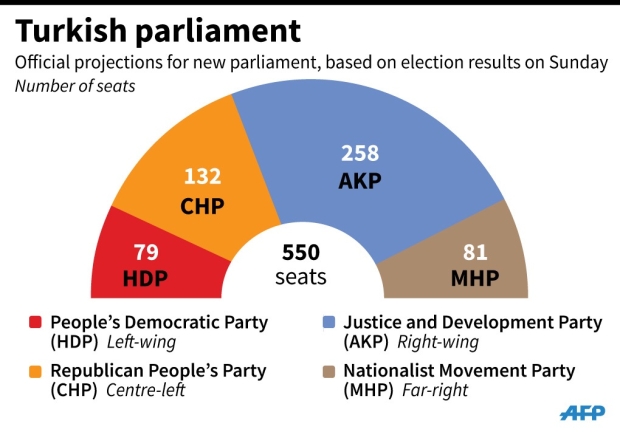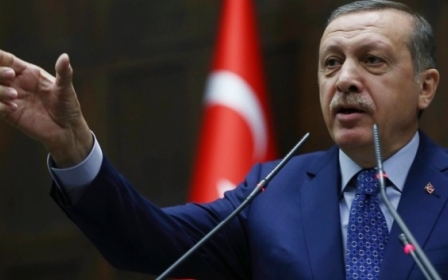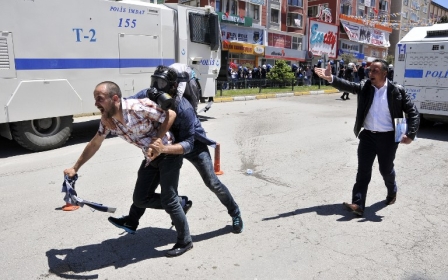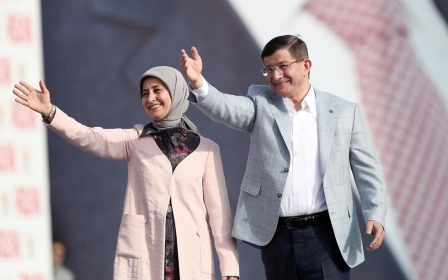Turkey's ruling AKP party loses parliamentary majority
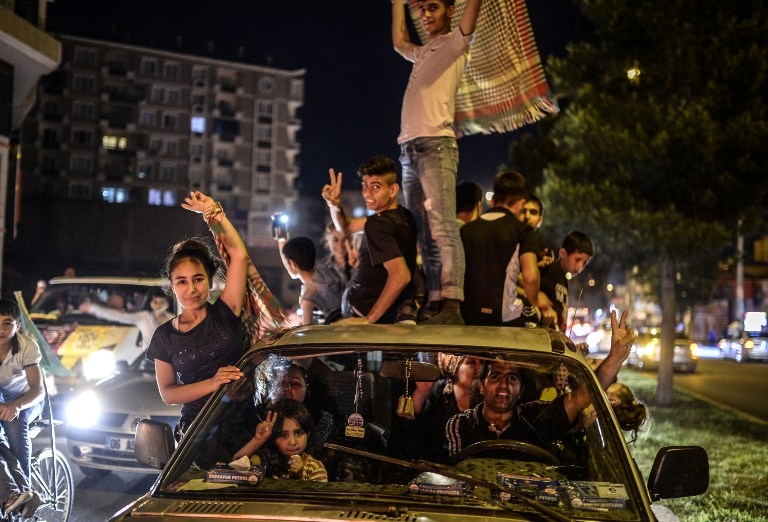
Turkey's ruling Justice and Development Party (AKP) won the most votes in Sunday's election but has lost its parliamentary majority and will need to form a coalition.
The results will put a damper on the party's push to move the country from a parliamentary into a presidential system and could have ramifications for the Kurdish peace process.
On Sunday, AKP secured 41 percent of the vote, followed by the Republican People's Party (CHP) with 25 percent, and the Nationalist Movement Party (MHP) with 16.5 percent.
With 12.5 percent, the newly formed pro-Kurdish People's Democratic Party (HDP) - which analysts predicted could upset AKP's majority - easily passed Turkey's 10 percent threshold for winning parliamentary seats.
According to the official seat projection, the AKP will have 259 seats in the 550-seat parliament, the CHP 131, the MHP 82 and the HDP 78.
The vote has been widely described as a blow for President Recep Tayyip Erdogan, the founder of the Justice and Development Party (AKP) which has led the country for the past 13 years.
Without the required three-fifths majority, the results will wreck Erdogan's dream - and a main point on the campaign trail - to hold a constitutional referendum to switch Turkey from a parliamentary to a presidential system.
Erdogan - the country's prime minister since 2003 before becoming president last year - wanted to strengthen the office of the presidency which was largely ceremonial until his arrival.
Although the AKP secured the largest share of seats in the 550-seat legislature, it fell 22 seats short of the 276 required for a simple majority.
For the first time since taking power in 2002, the AKP will be forced to look for coalition partners if it wants to retain power. But how easy it will be to do is unclear.
“The AKP said it would not accept a coalition government, nor is it likely that the other three main parties will put aside their differences,” Kilic Kanat, a columnist for the pro-government Daily Sabah newspaper told MEE.
At this point, it is very difficult to envisage the Republican People's Party (CHP), Turkey’s second largest party, bridging the gap between the conflicting ideologies of the pro-Kurdish HDP and the Nationalist Movement Party (MHP), Kanat said.
Moreover, coalition governments in Turkey have a poor historical track record, bringing about periods of economic and political crisis that have resulted in military coups in the 1970s and 1990s, he added.
“Unless the three other parties unite to overthrow the AKP, a development that would in itself be unstable, Turkey could face another parliamentary election within two months," Kanat said.
The four largest parties have 45-days to form a coalition before Erdogan can call for re-election.
Erdogan may seek this option believing that the prospect of a weak government would scare voters back into the AKP fold, added Kanat.
While analysts say this is an unlikely scenario, the pro-Kurdish party will be represented in the parliament.
If AKP does form a coalition, some analysts believe the party is likely to partner with the far-right nationalist MHP. Such a move could throw the precarious peace process between the government and the outlawed Kurdistan Workers' Party (PKK) into jeopardy.
“If a coalition were to be formed, it will be with MHP and one of the concerns of the HDP is that would end the peace process with the Kurds,” Aaron Stein, an associate fellow at the Royal United Security Institute (RUSI), told MEE ahead of the elections.
New MEE newsletter: Jerusalem Dispatch
Sign up to get the latest insights and analysis on Israel-Palestine, alongside Turkey Unpacked and other MEE newsletters
Middle East Eye delivers independent and unrivalled coverage and analysis of the Middle East, North Africa and beyond. To learn more about republishing this content and the associated fees, please fill out this form. More about MEE can be found here.


